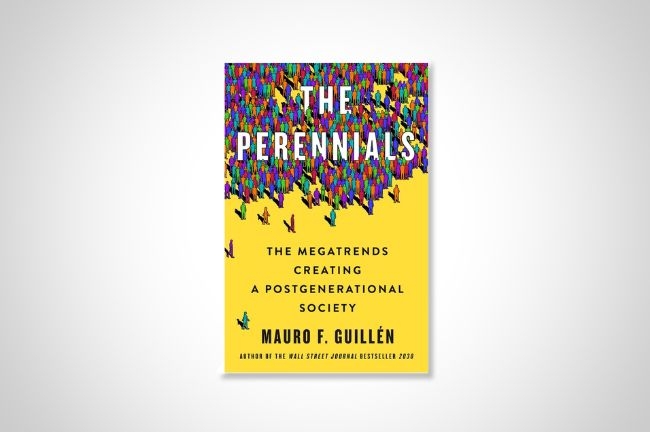You have /5 articles left.
Sign up for a free account or log in.

Macmillan Publishers
The Perennials: The Megatrends Creating a Postgenerational Society by Mauro F. Guillén
Published in August 2023
There are several reasons why I enjoyed reading and highly recommend Mauro Guillén’s new book, The Perennials: The Megatrends Creating a Postgenerational Society.
First, Guillén is a sociologist. I’m a sociologist. We need more sociologists writing nonfiction books for a general audience. Guillén teaches at Wharton.
Second, The Perennials has some smart things to say about universities. Most books I read and talk about in this space say nothing about higher education, forcing me to make the connections. Guillén brings his arguments about rethinking how we think about generations and the life course back to the university.
And third, The Perennials gets the formula right for fun nonfiction. There is some Goldilocks nonfiction zone of ideas that make you think, trends and data that build some knowledge, and stories that drive the narrative. Guillén’s writing hits that sweet spot.
There are three big arguments in The Perennials. The first is that, as individuals, we would be wise to rethink our lives following a rigid play/learn/work/retire sequence. As life spans (and health spans) grow ever longer (if you are reading this, you should prepare for a 100-year life), the rigid segmentation between school, employment and retirement no longer makes much sense. We must consider integrating learning, work and play into all segments of our healthy life.
Throughout The Perennials, Guillén talks about the importance of online learning. And he actually seems to know what he’s talking about when he talks about online learning. That is unusual for authors (and academics) outside the field. The book points out how online learning enables full-time workers to be learners. I appreciated that observation.
The second big argument in The Perennials is that organizations, including for-profit companies and nonprofit universities, would benefit from rejecting a sequential life course mind-set. Companies would attract and retain a more talented and diverse workforce if they allowed employees to integrate work and family commitments fully. Both universities and companies would be better off if they proactively integrated different age groups into their classes, programs and work teams.
University leaders should double-click on the idea that learning is catalyzed by intergenerational collaboration. Too many of our degree and nondegree programs are de facto or de jure age-segregated. We are probably doing too little in higher education to build degree and nondegree programs (both residential and online) that are explicitly directed at building multigenerational cohorts.
Finally, The Perennials makes the case that sequential life thinking helps to structurally disadvantage low-income and underrepresented groups. As a society, we leave behind too many people who cannot progress through a standard set of milestones. There is far too much emphasis on getting young adults into college and not enough on keeping them progressing toward graduation. Nor does our society do enough to provide educational opportunities to working parents and older workers.
While segmenting populations by generation may be illuminating and fun, there is little evidence that generational thinking is either a valid or reliable tool for social analysis.
The Perennials makes a good case that individuals, organizations and policy makers would benefit from adopting a multigenerational mind-set.
What are you reading?








